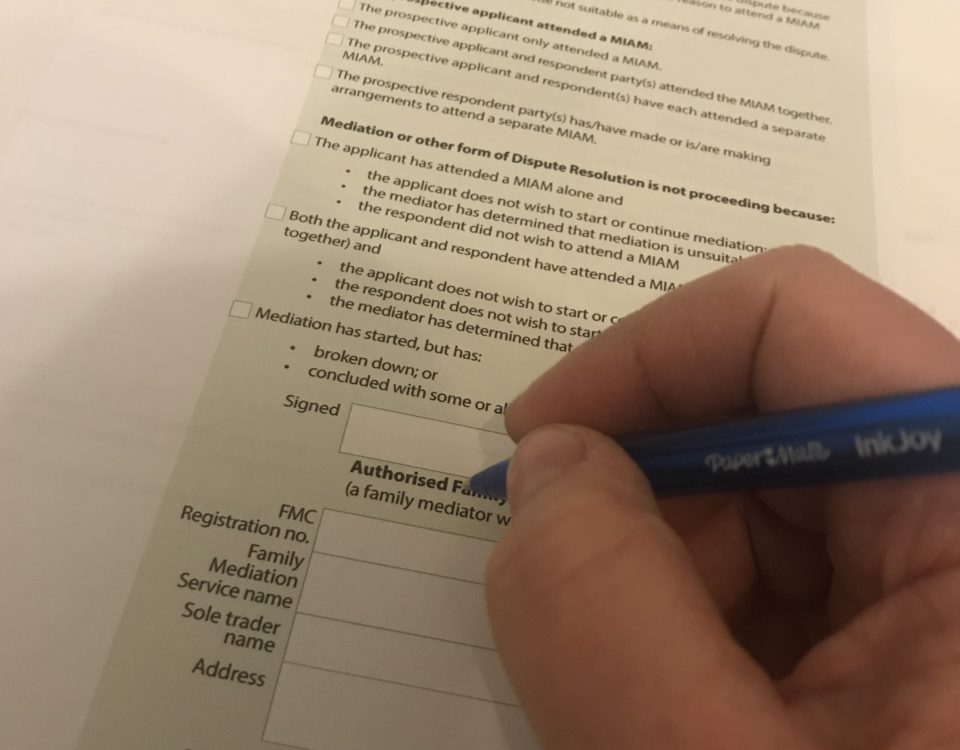Watch this video to find out how mediation helps and understanding how mediation works
October 3, 2018
Children in divorce…
October 21, 2018Mediation is provided free to those eligible. The other party also benefits as the Mediation Information and Assessment Meeting (MIAM) and the first mediation meeting will be free of charge for both.
With some exceptions, solicitors are no longer able to offer Legal Aid, therefore mediation is now the main source of government funding for resolving family problems.
Mediated Dispute Solutions has a contract from the Legal Aid Agency to provide publicly-funded family mediation services. The Legal Agency provides publicly-funded mediation through mediators accredited by the Family Mediation Council (those who hold FMCA) and have a contract from the Legal Aid Agency.
If you think you or your ex partner may be eligible for legal aid you can use the ‘Can you get legal aid ‘ tool on the Ministry of Justice website. Go to www.gov.uk when you enter the site, click ‘Start Now’; choose ‘Family’; choose ‘Family Mediation’; click ‘Yes’; click ‘Check if you qualify financially’. Enter details in calculator.
When you come along to your first appointment we will ask you to provide information to demonstrate you are eligible.
Evidence required for Legal Aid assessment
If you think you might get Legal Aid for mediation because you are on benefits, or working but on a low income, we can work out for you whether you qualify. If you bring to your first appointment the evidence listed below, the mediator should be able to tell you there and then whether you qualify for Legal Aid. If you are living with someone as husband or wife, we will also need to see the same information for them.
For those in receipt of the following benefits:
- Universal Credit
- Income Support
- Income based Jobseeker’s Allowance (JSA)
- Income related Employment and Support Allowance (ESA)
- Pension Guarantee Credit
We must see –
The original notification letter, if this is more than six months old, we must also see a recent bank statement (no more than one month old), for the whole month preceding the date of your appointment. If you are in receipt of Universal Credit, we must see evidence of the payment you received in the month before your appointment.
You must also bring with you your National Insurance (NI) number.
If you are in paid work:
- If you are paid monthly, your most recent pay slip. If you are paid weekly, your last four consecutive payslips.
- If in receipt of tax credits, the most recent award notice. If this is more than six months old, a recent bank statement (no less than one month old).
- Evidence of rent or mortgage payments.
- Child care costs (if over £600 per month) – a bank statement and copy of the agreement/contract.
- Bank statements for the month preceding the date of your appointment, for all accounts held either in your own name and/or jointly with someone else.
If you are self-employed:
- Bank statements for the month preceding the date of your appointment, for all accounts held either in your own name and/or jointly with someone else, and in the name of your business.
- Last year’s complete accounts.
- Self-assessment tax return for the last tax year.
- If in receipt of tax credits, the most recent award notice. If this is more than six months old, a recent bank statement (no less than one month old).
- Evidence of rent or mortgage payments.
- Child care costs (if over £600 per month) – a bank statement and copy of the agreement/contract.
If you are retired:
- Evidence of gross pension income.
- Bank statements for the month preceding the date of your appointment, for all accounts held either in your own name and/or jointly with someone else.
Deborah Butterworth is a FMCA Family Mediator and provides both private and publicly-funded mediation. If you are unsure about your eligibility please contact us. A latest guidance allows mediators to do the eligibility check on the phone or video conference. The evidential documentation and the Legal Aid Application form can be signed and sent in the post.




